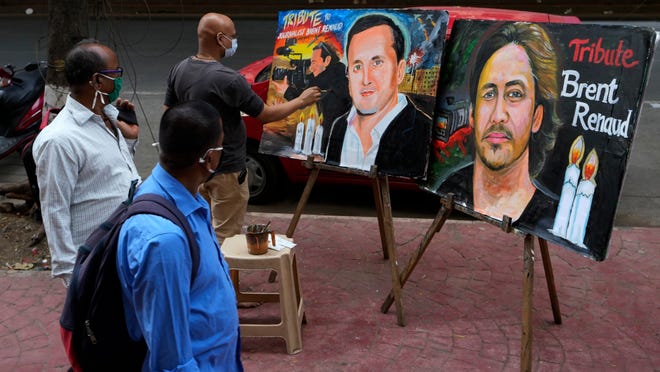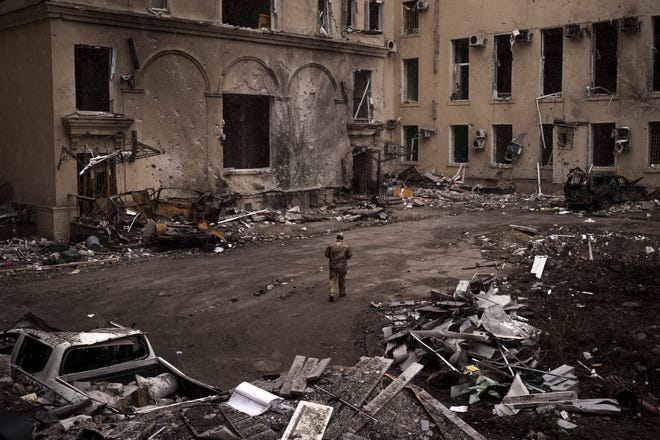The Kremlin tamped down expectations Monday that face-to-face talks with Ukraine negotiators scheduled for Tuesday and Wednesday would result in a deal to end Russia’s deadly, destructive invasion.
“Regrettably, we cannot say there have been any significant achievements or breakthroughs so far,” Russian presidential spokesman Dmitry Peskov said Monday. But he said the face-to-face meeting in Turkey could allow for “more focused, tighter and meaningful” talks.
Russian Foreign Minister Sergey Lavrov rejected Ukrainian President Volodymyr Zelenskyy’s latest appeal for a meeting with President Vladimir Putin, saying it would be counterproductive until Ukraine and Russia are close to agreeing on key issues.
Zelenskyy told independent Russian journalists Sunday that his government would consider declaring neutrality and offering security guarantees to Russia. That pact would include keeping Ukraine nuclear-free, he said.
FALLOUT FROM BIDEN REGIME-CHANGE REMARK:‘Clarity is important’: Dems clarify Biden’s Putin remark; Republicans warn words carry weight
But Zelenskyy said adopting a neutral status would need to be guaranteed by third parties and put to Ukrainian voters in a referendum after Russian troops withdraw – within a few months once Russian troops leave.
Russia almost immediately banned Zelenskyy’s remarks from being published. Roskomnadzor, the Russian federal agency regulating communications for Moscow, issued the ban Sunday and said there could be action taken against the Russian media outlets that took part, including “those that are foreign media outlets acting as foreign agents.”
Russia recently passed a law threatening up to 15 years of prison time for anyone publishing information that goes against Moscow’s narrative about the war.
Latest developments
►Kyiv school reopened for online learning Monday. Teachers were told not to overwhelm students already under strain due to the war.
Russia, releasing information on its losses in Ukraine for the first time in weeks, says 1,351 servicemen have been killed and 3,825 have been injured as of Friday. NATO has estimated Russian deaths at several thousands while acknowledging the true number is difficult to determine.
►The Oscars took 30 seconds of silence for Ukraine, beginning with a tribute from Ukrainian-born Mila Kunis and ending with the Academy Awards fading to black about midway through Sunday’s show.
►A top Ukrainian official accused Russia of trying to split Ukraine into two countries Sunday, drawing a comparison to North and South Korea.
Tensions over Russian energy heighten
The Group of Seven countries have agreed to reject Russia’s demand to pay for Russian energy imports in rubles, Germany’s energy minister said Monday. Robert Habeck told reporters Monday that “all G-7 ministers agreed completely that this (would be) a one-sided and clear breach of the existing contracts.”
Russia supplies about two-thirds of Germany’s natural gas, half of its coal and one-third of its oil.
Kremlin spokesman Dmitry Peskov said the demand for payment in rubles remained and warned that “we clearly aren’t going to supply gas for free.”
Zelensky hopeful ahead of talks
Ukraine’s priorities at the talks in Turkey this week will be “sovereignty and territorial integrity,” Ukrainian President Volodymyr Zelneskyy said.
“We are looking for peace, really, without delay,” Zelenskyy said. “There is an opportunity and a need for a face-to-face meeting in Turkey. This is not bad. Let’s see the outcome.”
Davyd Arakhamia, the leader in parliament of the faction of President Volodymyr Zelenskyy’s Servant of the People party, said on Facebook that the in-person talks were agreed upon in a video consultation. The two sides have met multiple times without reaching a deal.
– Celina Tebor
Contributing: The Associated Press
Ukraine war threatens food supply in Arab world
From Lebanon, Iraq and Syria to Sudan and Yemen, millions of people in the Middle East whose lives were already upended by conflict, displacement and poverty are now wondering where their next meals will come from.
Ukraine and Russia account for a third of global wheat and barley exports, which countries in the Middle East rely on to feed millions of people who subsist on subsidized bread and bargain noodles. They are also top exporters of other grains and the sunflower seed oil that is used for cooking.
Even before the war in Ukraine, people in countries across the Middle East and North Africa were not getting enough food to eat. Now with trade disruptions spurred by the conflict, more commodities are becoming either unaffordable or unavailable.
“Put simply, people cannot afford food of the quality or quantity that they need, with those in conflict- and crisis-affected countries … at greatest risk,” said Lama Fakih, Middle East and North Africa Director at Human Rights Watch.
Refugees fleeing Ukraine
Just one month since the Russian invasion of Ukraine, more than 3.6 million refugees have been forced to flee the country, making this the fastest-growing refugee crisis since World War II, according to the United Nations refugee agency.
An additional 6.5 million people have been displaced internally within Ukraine and over 12 million more have been affected in the areas hardest hit by the war.
Humanitarian needs are increasing exponentially.
“Many people remain trapped in areas of escalating conflict and, with essential services disrupted, are unable to meet their basic needs including food, water and medicines,” the agency announced in a bulletin. “The delivery of lifesaving aid remains challenging, with a lack of safe humanitarian access.”
–Swapna Venugopal Ramaswamy



